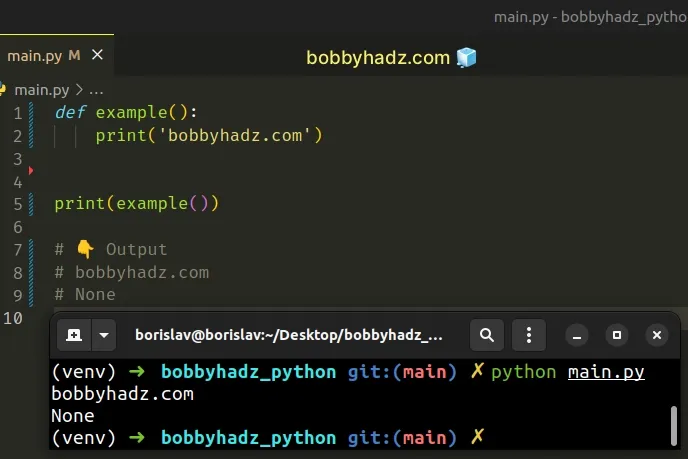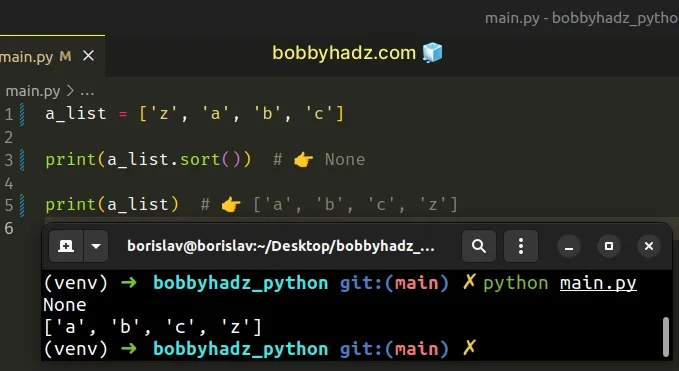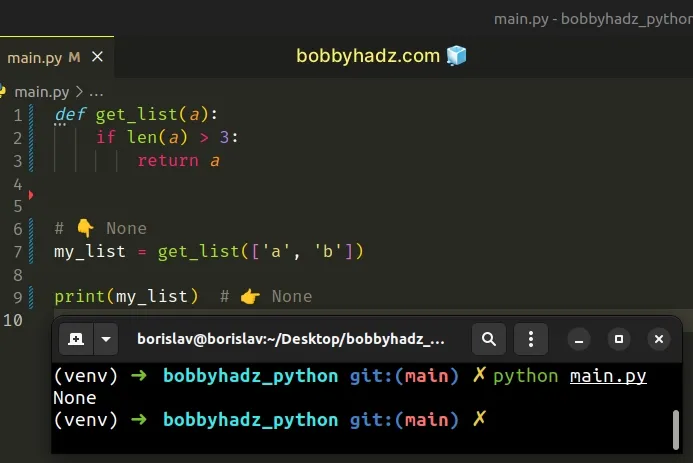Why does my function print None in Python [Solved]
Last updated: Apr 8, 2024
Reading time·3 min

# Why does my function print None in Python [Solved]
Functions often print None when we pass the result of calling a function
that doesn't return anything to the print() function.
All functions that don't explicitly return a value, return None in Python.
def example(): print('bobbyhadz.com') print(example()) # 👇️ Output # bobbyhadz.com # None

Notice that we called the print() function twice.
When we call the example() function, the print() function gets called with
hello world, and then we print the result of calling the example() function.
# Functions that don't return anything return None
The example function doesn't return anything, so it ends up implicitly
returning None, so None gets printed.
If we were to return a value from the function, the value would get printed.
def example(): print('bobbyhadz.com') return 'abc' print(example()) # 👇️ Output # bobbyhadz.com # abc
We used the return statement to return a value from the function.
Now when the example() function is called, we print the strings
bobbyhadz.com and abc, instead of None.
None.If you don't want to return anything from the function, remove the print()
call when calling the example() function.
def example(): print('hello world') example() # 👇️ Output # hello world
There is no point in printing the result of calling a function that doesn't
return anything because we're always going to print None.
# The most common sources of None values in Python
The most common sources of None values are:
- Having a function that doesn't return anything (returns
Noneimplicitly). - Explicitly setting a variable to
None. - Assigning a variable to the result of calling a built-in function that doesn't return anything.
- Having a function that only returns a value if a certain condition is met.
sort()) that mutate the original object in place and return None.# Some built-in methods return None
Some built-in functions, such as sort(), append(), extend() return None
because they mutate the object in place.
a_list = ['z', 'a', 'b', 'c'] print(a_list.sort()) # 👉️ None print(a_list) # 👉️ ['a', 'b', 'c', 'z']

Notice that the call to the list.sort() method printed None.
The list.sort() method sorts a list in place and returns None.
Make sure to not store the result of calling methods that return None in
variables.
a_list = ['z', 'a', 'b', 'c'] # ⛔️ don't do this result = a_list.sort() print(result) # 👉️ None print(a_list) # 👉️ ['a', 'b', 'c', 'z']
There is a convention in Python for methods that mutate an object in place to
return None.
# A function that returns a value only if a condition is met
Another common source of None values is having a function that returns a value
only if a condition is met.
def get_list(a): if len(a) > 3: return a # 👇️ None my_list = get_list(['a', 'b']) print(my_list) # 👉️ None

The if statement in the get_list function is only run if the passed in
argument has a length greater than 3.
None.To get around this, we could return a default value if the condition is not met,
e.g. an empty string, an empty list, 0, or any other value that suits your use
case.
def get_list(a): if len(a) > 3: return a return [] # 👈️ Return an empty list if the condition is not met # 👇️ [] my_list = get_list(['a', 'b']) print(my_list) # 👉️ []
Now the function is guaranteed to return a value regardless of whether the condition is met.
# Additional Resources
You can learn more about the related topics by checking out the following tutorials:
- Why does list.reverse() return None in Python
- How to Remove the None values from a Dictionary in Python
- Join multiple Strings with possibly None values in Python
- How to Remove the None values from a List in Python
- Convert None to Empty string or an Integer in Python
- How to Convert JSON NULL values to None using Python
- UserWarning: Could not import the lzma module. Your installed Python is incomplete

